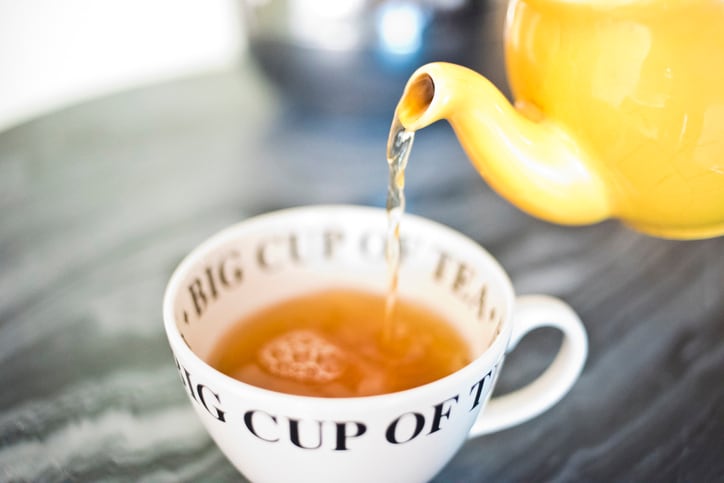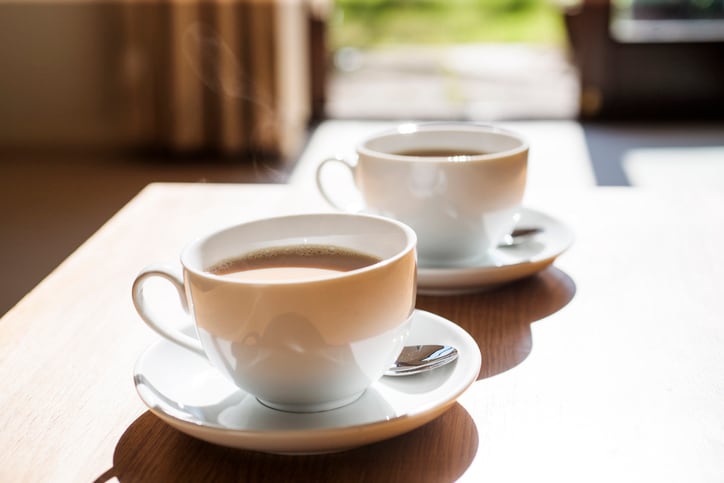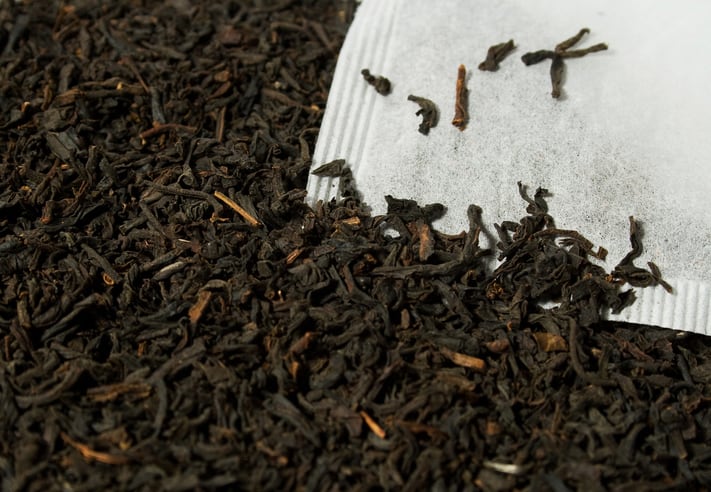When tea first arrived in the UK from China in the mid-17th century, it was so expensive only royalty and the very wealthy could afford it.
Today, it’s no longer considered a luxury item. Tea drinkers, and particularly those in the UK, are used to paying very little for tea and don’t put much value on it (the cost of an average tea bag today is around 2-3p).
But, with so little value placed on tea, where does that leave the workers who produce it?
It’s a problem the Fairtrade Foundation is setting out to put the spotlight on... and it wants to drive change across the industry.
Tea: a complex market
At first glance, the tea market could be expected to be like coffee or cocoa.
All three are imported to consumers from afar, leaving most consumers quite detached from the origins.
All three support the livelihoods of workers in poorer countries, and all have challenges in making sure these workers are fairly paid (the Fairtrade Foundation works in all these areas).
And all three face the challenges and uncertain future posed by climate change.
But then the similarities start to end. Coffee and cocoa, for example, are commanding record prices. Not so tea, which instead has very low prices: from where it’s sold as a commodity, to the price consumers pay in shops where it’s bought at retail.
And even that low price we pay in shops tends to be added once tea reaches brands and retail: the price of tea at the grower and cooperative level remains low.
Why is this important? Despite the low value, tea is an important source of income and livelihoods in many countries, contributing to economic growth and food security. However, most workers picking tea on estates earn significantly below a ‘living wage’.
For example, in Assam (which produces half of India’s tea) the minimum wage for workers is 250 rupees a day (around £2.50). A living wage would be around 450 rupees a day (£4.50).
The value to tea is only added once tea moves through the supply chain. An Oxfam report estimates that, out of every kilogram of Assam tea sold, tea brands and supermarkets take a cut of up to 95%. Only 5% remains with tea estates, and workers are paid from within that 5%.
The tea industry also has many deep and complex issues. The supply chain is a complicated one: covering growers, pickers, processors, auctions, wholesalers, packers, distributors and retailers.
The production of tea often fails to take place within a safe and healthy working environment, says Fairtrade, with tea workers and farmers facing several unique challenges.
Tea cultivation is labor-intensive: workers (who are often women) must walk long distances and frequently carry up to 30kg of green leaf tea on steep terrain. Snakes, parasites and other hazards are common in many regions, and workers are not always equipped with the right protective kit on the fields or in factories.
Despite all this, many businesses are not taking responsibility for the impact their purchasing practices have on the people in their supply chains, says Fairtrade.
Fairtrade tea
- The Fairtrade movement supports more than 330,000 people in tea growing communities across 11 countries: including primarily in India, Sri Lanka, Kenya and Malawi.
- Fairtrade tea famers and workers have earned £50m in Fairtrade Premium through sales of Fairtrade tea in the UK over the last 30 years.
- The UK accounts for 61% of all Fairtrade tea sold across the world
Not my cup of tea
Faced with the challenges, driving change in tea could seem like an insurmountable task. But the Fairtrade Foundation has spent the past few months researching the intricacies of the tea market dynamics and working with stakeholders along the value chain and set out a plan of how to scale up Fair Trade tea.
Firstly, it knows that consumers want to buy ethically produced tea and do the right thing. Most know the Fair Trade and have at least a loose idea of what the mark stands for.
That’s not yet translating onto the market in real mass (around 7-10% of tea sold in the UK is Fair Trade). Most consumers see tea as a low-cost commodity, giving little thought for the workers who grew and picked the tea and how they were remunerated for their work.
Raising awareness with the new ‘Brew it Fair’ campaign hopes to change that. The campaign wants to consumers to vote with their feet: buying Fairtrade products and avoiding cheaper brands which don’t have any assurance of how workers have been paid.
Low tea prices
Specialty coffee has breathed a new life into the coffee industry with ideas such as single origin or other premium offers. While this does exist in tea (Darjeeling being the best-known example), the vast majority of what’s drunk globally is simply tea as a bulk commodity, making it harder to drive up prices.
Secondly, Fairtrade has developed and fine-tuned its model over the years to maximize benefit to workers. What happens is that growers are paid a premium for their tea: then those growers come together and decide themselves how this money should be spent in their communities. Tea growers and pickers have decided, for example, to put the money towards education for their children, transportation for schools, or healthcare facilities for the community.
It’s a model that works, says the organization, as it puts power in the hands of tea workers and their communities.
Currently, only around 4% of tea production that is eligible for Fairtrade production is sold on Fairtrade terms at present.
And Fairtrade wants to drive that figure up. It believes tea can be an agent for change. It’s already a massive global employer: providing work for an estimated 13 million people. It has the potential to contribute to rural development, improve education outcomes and empower women, who are often the pickers.
The benefits of becoming Fairtrade
While the total amount of Fairtrade tea sold remains low, brands are showing increasing interest in the certification.
In the UK, Clipper is the largest Fairtrade tea brand and supported the creation of Fairtrade tea standards more than 30 years ago. Co-op became the first UK retailer to sell own-brand Fairtrade tea in 2008, since joined by Waitrose & Partners. And this year, Sainsbury’s has converted all of its black tea sourcing to Fairtrade.
Greggs has been offering Fairtrade tea in its stores and on-the-go since 2012, while Marks & Spencer generates the most Fairtrade Premium for tea growers out of all UK retailers.
So why should brands support the Fairtrade movement and become certified? There are two main reasons, said Emma Mullins, Senior Sustainable Sourcing Manager for Tea at Fairtrade Foundation, who has been working in the Sustainable Sourcing team for nearly 10 years and a has a background in the International Development sector.
“We want to work with as many brands and retailers as possible because we see every day the benefits that selling tea on Fairtrade terms can bring to tea growers,” said Mullins.
“Producer organisations that sell Fairtrade tea get a guaranteed minimum price that acts as a safety net in times of very low prices, and the Fairtrade Premium... extra money to improve their communities, their businesses and adapt to climate change. They are also supported with expert teams based in origin countries to deal with their biggest challenges.”
But brands should also think about Fairtrade because consumers want ethical products, said Mullins.
“Despite the cost-of-living crisis, UK consumers continue to buy ethical products and are more aware than ever of the harm businesses can cause when they don’t respect the dignity and rights of the people who produce the food, drink or clothes we buy. With our tea campaign, we hope to bring that awareness also to tea drinkers.”
And finally, the scale that Fairtrade has achieved over the last 30 years is the perfect springboard for change.
”Belonging to a movement and with the Fairtrade Mark being the best-known, most trusted ethical label in the UK, we also have the opportunity to directly engage with UK businesses to change the way that trade works for tea growers," she said.
Another key arrow to the bow is legislation. The Fairtrade Foundation is calling on the UK government to introduce a new law to ensure businesses take responsibility for problems in their supply chains. It wants to see the government introduce a law on human rights and environmental due diligence (HREDD), centered on the needs of overseas farmers and workers.
That’s all wrapped up in a campaign launched by Fairtrade this month, entitled Brew It Fair, which calls on consumers, brands and the government to all do their part.
Three-pronged attack
Change needs to be driven from all directions. Governments need to ensure that human rights are protected, and environmental projects are sufficiently funded.
Consumers need to think about the brew they’re buying and vote with their feet.
And brands need to see the moral responsibility and business advantages in supporting Fairtrade.
It won’t be easy, but driving a sea change is possible, says Fairtrade.



